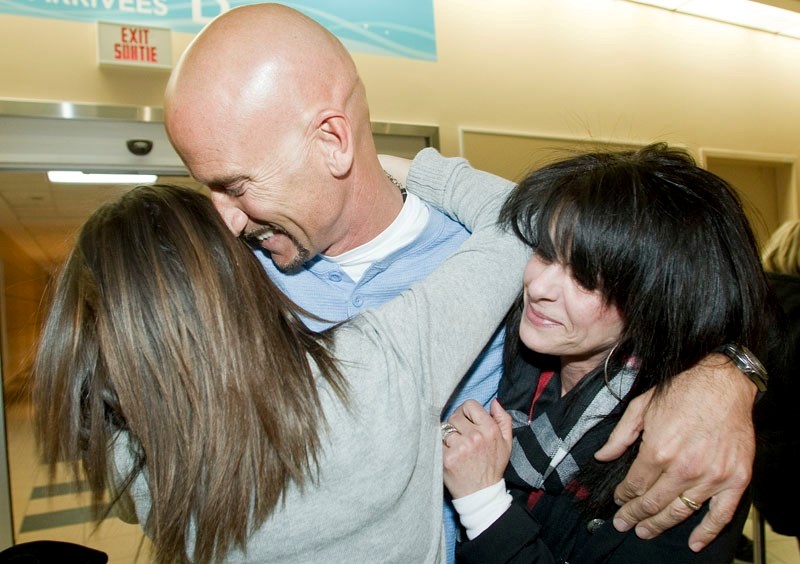Grant Cathrea's journey home was one of fear, uncertainty, extortion and vomit.
Cathrea, a power engineer who lives in St. Albert, returned home from Libya Tuesday night after a weeklong struggle to leave the country. He is one of hundreds of Canadians that have left the nation, which is now gripped by violent protests against its leader, Col. Moammar Gadhafi.
His thoughts and prayers are now with the people of Libya, he says.
"I have a lot of friends there, and I hope that this all settles out."
Watch the video
Change in fortune
Cathrea had worked for Libya's Zueitina Oil for 14 years, and was stationed at a large oil and gas plant about 180 kilometres from the city of Benghazi. "It was an extremely safe country," he says, and he never felt threatened by the locals. "You could walk anywhere in that country any time of the night, and you were never in danger."
It wasn't until he got the order to shut the gas plant down last Feb. 23 that he realized something was up. The next day, he learned from the BBC that Gadhafi had ordered jets to bomb Benghazi and his plant.
"It was unnerving," he says. "I told [the workers] that if anybody doesn't want to stay, they could go." He called the [Canadian] embassy in Tripoli repeatedly, but they had no help to give him.
Cathrea says he had a chance to jump on a bus to Benghazi, but didn't, despite encouragement from his wife, Nada.
"I still had a job to do, and we didn't feel there was an imminent threat." If they were going to leave, he says, they were going to go together and with a plan.
Four-day ordeal
That plan came together on Feb. 25. The company bused Cathrea and 43 others to a desert airfield about 300 km away. "It was a chaotic scene," he says, with everyone pushing and shoving to get on the plane. He and his two Canadian co-workers were at the base of the stairs when the crew declared the plane full.
"The captain and another individual in the cockpit kept looking out the windows to us," he recalls. Finally, a flight attendant came down, moved the crowds aside, and said, "You three! Now." They scrambled aboard.
The plane was overloaded, with many passengers sitting on armrests. Cathrea and his co-workers spent the whole flight standing by the bathroom. "My partner from Quebec, he rode on the toilet the whole way."
They landed at Tripoli airport at midnight. The airport and parking lot were full of tents and people wrapped in blankets, soaking in the cold rain. "It was just a refugee camp."
Travelling by car into town that morning to get their passports, Cathrea says they saw no signs of the conflict that had gripped the nation. "It was very strange," he says. "There was no army, no tanks, no military presence at all … it was like everyone was going about their normal business."
Cathrea and his crew tried to leave on a catamaran to Malta, but the crew demanded they pay €2,000 (about C$2,719) each to board. They didn't have the cash, but convinced them to let them pay by credit card in Malta.
There followed a stomach-churning voyage over rough seas. "It was just the sound of vomiting from half an hour out of harbour," he says. "I think I went through 15 of those sick-bags." The one exception was his pal from Quebec, he recalls with a laugh, as he was used to ships.
Cathrea had his first meeting with Canadian embassy officials in Malta. When he told the embassy man about the €2,000 boat fee, the man said, "Give me 20 minutes." After haranguing the boat crew, he came back and said, "How does €250 sound?" They paid immediately. Cathrea caught the last seat on a flight home soon after.
No regrets
Cathrea says he doesn't blame government for its lack of help in Libya — it was a very difficult situation. "I'm not pointing the finger or blaming."
He also paid out of pocket for every step of his trip, he emphasizes. "We didn't cost the taxpayer one penny to get out of there."
Nada thanked the many people who supported her family during this ordeal. "I'm very happy to have my husband home."
Cathrea says he's not sure if he'll return to Libya in the future. "I'll probably look for work around here," he says.
"Yes, that would be a good idea," Nada added.
Online Extra
View a video of the Cathrea's reunion with family in the Multimedia section of www.stalbertgazette.com.




